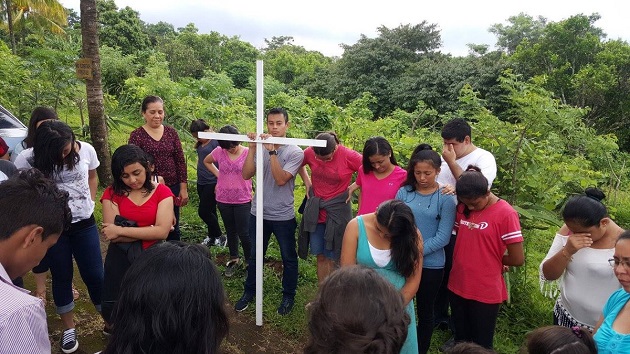How students in Latin America demonstrate the gospel.
 Photos: Students of IFES groups in Latin American countries.
Photos: Students of IFES groups in Latin American countries.
Isabella closed the front door and looked up at the sky. Hazy. Not as blue as it used to be, she reflected. She’d done this journey every day for as long as she could remember. Across the park, past the row of shops, and down the hill past the church on the corner. The university bus stopped there, opposite her old school.
She still loved this neighbourhood. But things had changed. Plastic bottles and broken glass were strewn across the pavements. It hadn’t rained for months and the park wasn’t as green as she remembered. Isabella didn’t want to stop hoping that something might change. But as the months passed by, it seemed less and less likely. What, or who, could possibly transform all this?
The environmental crisis
Students in Latin America cannot ignore the environmental crisis. It’s on their doorstep. Literally. In other parts of the world, the impact of consumerism and environmental carelessness is far removed. Out of sight, out of mind. But in Latin America it is the daily, visible reality. ABUB Brazil staff Jessica told us more:
“In some countries trash goes overseas. But in ours it’s closer to our reality. Not many cities have good recycling projects. We see the 'mountains of trash' in dumping grounds by the highway as we go to the beach, and hope the beach isn’t dirtier than the last year. But it usually is. We see the impact of a poor environmental investment and high consumerism every day.”
WHY WE CARE FOR THE ENVIRONMENT
We talked to staff and students in Latin America for whom this is a big issue and who respond to the issue in a way to show and share the gospel of Jesus. Here are three thoughts and challenges on how we care for the environment:
1. Stewardship
Firstly, Genesis tells us that this is God’s world. He’s the Creator and he loves his creation. It’s beautiful, magnificent and intricate to a degree we cannot even begin to comprehend. God gives humankind a mandate to care for this world as his stewards. This is our privilege, and our responsibility. We are not to treat God’s world as we wish, without reference to him or to others. The words we find in Genesis 1, ‘subdue’, and ‘rule’, are not excuses for oppression, exploitation, and greed. On the contrary, attitudes of generosity and care should characterize God’s stewards.
What does our stewardship of creation say about our understanding of God?
2. Loving our neighbours
Secondly, our actions against the environment affect not only the world God has made, but also the people he’s made. The global problems of social inequality and injustice mean that it’s usually the poor who are impacted the most. For the rest of us, it’s more comfortable to take the ‘out of sight, out of mind’ approach to the problems of waste disposal, air pollution or plastic consumption. But the small decisions we make each day are not insignificant to people on the other side of the world.
Our choices reveal our attitude to those people, and to the generations to come. Are we loving them as Jesus commands us to?
3. Gospel conversations
Thirdly, caring for the environment builds bridges over which the gospel can be taken. It can pave the way for gospel conversations. Even small things like picking up rubbish, or taking our reusable cup to Starbucks, get noticed. Onlookers are curious and want to know why. It’s an easy way in to talking about the Creator God who loves his creation.
These small actions might seem trivial in some contexts, but when the way creation is neglected is so visible and the effects so tangible, taking visible steps to act differently says something about what we care about. This was the experience of Christian students in Brazil who started using reusable cups instead of plastic ones:
“Many students have had the opportunity to impact their universities as other students have seen their behaviour and have commented, ‘I didn’t think you Christians care’. It opens conversations about the transformation the gospel brings.”
How can our care for the environment attract the attention of people around us? Are we ready to explain our motivation?
CREATION CARE ON CAMPUS
Students across Latin America want to see their campuses transformed by the gospel, spiritually and environmentally. Though their ability to influence decisions might be limited at the national level, and even at the university level, they can share the gospel and they can encourage creation care on campus. Many students see these as inextricably linked.

In recent months, several national movements in Latin America have been supported by IFES Innovation grants to run evangelistic-environmental projects on their campuses. Through the projects they’re seeking to make a difference practically to the environment while at the same time using their actions as a way-in to share the gospel.
Nicaragua
CECNIC Nicaragua students ran a project last year called ‘God’s Green Action’. After four months of training, 20 leaders went to serve a rural community on the outskirts of Managua. Partnering with the local church, they held a service, handed out copies of John’s gospel and planted trees. They later held an ‘eco-theological fair’ on their campus, giving students an opportunity to hear the gospel and think about environmental concerns from a biblical perspective.
Panama
Students of CEC Panama are running a project this semester called ‘Footprints’. The project consists of workshops where students will look at what the Bible says about caring for the environment, and how they can apply that to their own lives. The second part of the project is to put up three interactive booths on campus where students can come and ask questions and engage with these big issues. CEC student Eunices told us more:
“We want to help students understand what happened at the Fall (the break between people and God, people and other people, people and the environment) and how God offers us relationship reconciliation through Jesus. Practically, we’re focusing on the issue of plastic and waste management, a particularly pertinent issue in our country at the moment.”
Ecuador
CECE Ecuador student groups are studying the book of Genesis this year. Alongside organising service projects, they are planning to put up stands on campus to create a space for dialogue around the theme of reconciliation and the environment.
This article was originally published as part of IFES Latin America week 2018. Find out more about student ministry and the issues Christians are engaging with in Latin America here.

Las opiniones vertidas por nuestros colaboradores se realizan a nivel personal, pudiendo coincidir o no con la postura de la dirección de Protestante Digital.
Si quieres comentar o